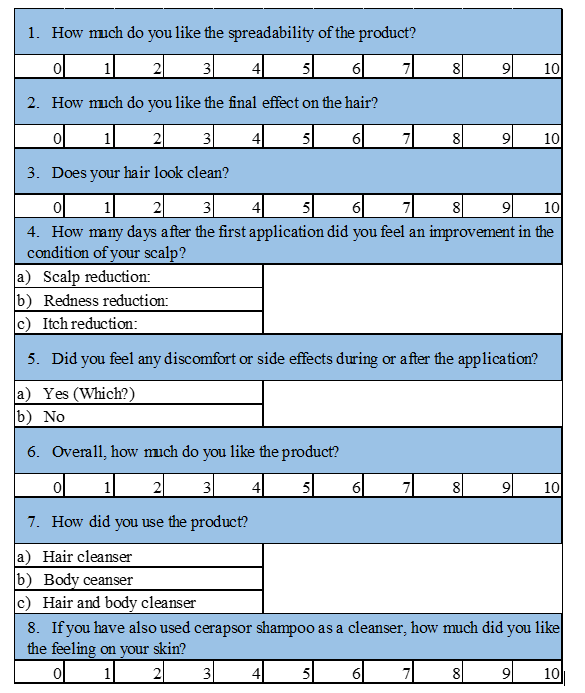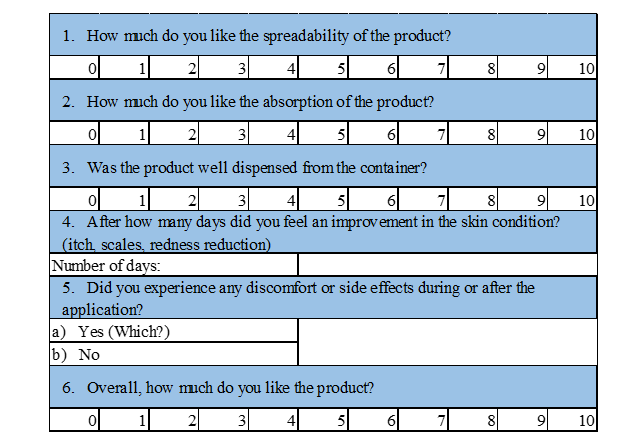Current Updates in Dermatological Problems
Research Article
New Topical Treatments for Scalp Psoriasis: A Single Center Study on Perceived Satisfaction and Effectiveness of Use of CSU Technology-Based Shampoo or Lotion
Burlando M*, Castelli R, Cozzani E, Parodi A
IRCCS Policlinico San Martino, Di.S.Sal. Section of Dermatology, Largo Rosanna Benzi 10, Genoa, Italy
*Corresponding author: Burlando M, Department of Dermatology, IRCCS Policlinico San Martino, Largo Rosanna Benzi 10, 16132 Genoa, Italy, Tel: +390105555761, Fax: +390105556641; Email: martina.burlando@unige.it
Citation: Burlando M, Castelli R, Cozzani E, Parodi A (2021) New Topical Treatments for Scalp Psoriasis: A Single Center Study on Perceived Satisfaction and Effectiveness of Use of CSU Technology-Based Shampoo or Lotion. Curr Updates Dermatol Probl. CUDP- 100006. DOI:10.53634/CUDP-106.100006
Received Date: 27 June, 2021; Accepted Date: 08 July, 2021; Published Date: 13 July, 2021
Abstract
Psoriasis is a chronic inflammatory disease characterized by skin barrier down regulation. Topic treatments have been formulated for skin barrier restoring. Scalp psoriasis management is particularly challenging, with patients often reporting unpleasant sensations after the application of topic products.
This study was conducted to investigate the perceived effectiveness and satisfaction after one-month treatment with CSU-technology products (shampoo or lotion), based on a mix of lipid and urea components, on 40 patients affected by scalp psoriasis.
Patients with mild psoriasis (n= 20) were prescribed to use the shampoo, those with moderate psoriasis (n= 20) were prescribed to use the lotion. Questionnaires on patients’ satisfaction and perceived effectiveness were administered. Patients were asked to rate each question from 0 to 10, with 0 as the lowest possible grade and 10 as the highest possible rate.
Patients using the shampoo reported the following mean scores: spreadability: 8.25; final effect: 8; cleanliness 8.55; days to see an improvement in scales: 10.05, on redness: 9.15, on itching: 8.45. The mean overall satisfaction score was 8.15.
In the sample of patients using the lotion, mean values were: spreadability: 7.65; absorption 7.75; product dispensing: 8.95; days needed to appreciate an improvement in itch reduction: 12 days. Total satisfaction with the lotion was 7.7.
This study indicates that the shampoo and the lotion may help manage scalp psoriasis, with good patients’ satisfaction in terms of pleasantness of use and self-reported efficacy. Further studies are warranted to confirm these preliminary results.
Keywords: Barrier down regulation; Itch; Itchy; Psoriasis; Scalp; Shampoo
Introduction
Psoriasis is a chronic inflammatory disease characterized by erythematous and scaling plaques that can affect a small part of the body or the skin's entire surface [1]. A hallmark of psoriasis is the disruption of the skin barrier, probably due to phospholipase down regulation, leading to decreased intracellular Ca2+ concentrations and nuclear factor of activated T cells activity [2]. Also ceramide and fillagrin deficiency are involved in the epidermal barrier dysfunction underlying the pathogenesis of psoriasis. Molecular studies and clinical experience have suggested that improvement of skin barrier function, through specific formulations containing epidermal lipids like ceramides, offers beneficial effects in the management of psoriasis [3,4].
To date, many systemic treatments lead to complete clinical remission [5].
In addition to systemic drugs, the market is flourishing with topical treatments. The latter are indicated for mild forms of psoriasis and sometimes are prescribed in combination with systemic therapies to provide relief in some areas of the body that are particularly difficult to treat [6]. One of these areas is the scalp. Up to 80% of patients with psoriasis, regardless of disease severity, have plaques on the scalp [7]. It has been shown that patients with scalp psoriasis have a worse quality of life than those with the same disease, but affecting areas that are not visible [7].
Moreover, adherence to treatment in patients with scalp psoriasis is complicated by the perceived satisfaction, in terms of pleasantness, related to the skin product. In fact, patients often report uncomfortable sensations after the application of the skin production the scalp, reducing their adherence to prescriptions [8].
Considering these issues, a single-center study was conducted to evaluate self-reported efficacy and satisfaction, in terms of pleasantness, of two recently marketed products for scalp psoriasis, characterized by an innovative formulation based on a mix of lipid and urea components.
Methods
Between September and October 2020, at the Dermatology Clinic of the Policlinico San Martino in Genoa, Italy, samples of Cerapsor LOTION and Cerapsor ACTIVE SHAMPOO were given to n=40 patients with a diagnosis of psoriasis. The inclusion criteria were: patients older than 18 years, with psoriasis and scalp psoriasis. Patients could be naïve on treatment or under treatment for psoriasis at least by 6 months.
All the patients signed informed consent.
Patients with mild scalp psoriasis (n= 20) were prescribed to use the shampoo, those with moderate psoriasis (n= 20) were prescribed to use the lotion. The lotion should be applied at least twice a day to the affected areas and massaged until it is completely absorbed. It should not be rinsed off.
After one month, all patients were asked to complete a questionnaire. To this aim, two questionnaires were prepared, one for the shampoo and one for the lotion, with 8 and 6 questions respectively (Table1 and 2). In both questionnaires, question 4 regarded the number of days to observe an effect; question 5 regarded the presence of side effects. For all the others, patients were asked to rate each question from 0 to 10, with 0 as the lowest possible grade and 10 as the highest possible grade.
Product features
Both the shampoo and the lotion feature CSU technology based on a lipid mixture, specifically selected for psoriasis skin barrier impairment (such as ceramide 3), and urea. This technology has been developed to rebalance the skin barrier, reduce inflammation and regulate cell turnover leading the skin to a better condition. In addition to this hydrolipid complex, Cerapsor products contain succinic acid: a dicarboxylic acid with a dermocompatible keratolytic action. Moreover, the cosmetic vehicle containing the active ingredients has been formulated to enhance their delivery and effectiveness on the psoriatic skin. Besides, Cerapsor Active shampoo contains niacinamide, which stimulates cell renewal and helps reduce redness, and a balanced blend of gentle tensioactives and conditioning compounds that clean hair and skin respecting the epidermal lipids. Patients are prescribed to use the shampoo daily for a minimum of three weeks. Cerapsor lotion contains beta glycyrrhetinic acid, a strong soothing agent that reduces itching and redness. Finally, both the products are formulated and manufactured to minimize the risk of allergies, free from fragrances, alcohol and preservatives that can cause allergies.
Results
All the patients enrolled in the study completed the treatment (n= 28 men and n=12 women; mean age 57±12).
In the sample of patients using the shampoo, mean values were as follows: spreadability: 8.25; final effect: 8; cleanliness 8.55; days to see an improvement in scales: 10.05, on redness: 9.15, on itching: 8.45. Out of 20 patients, none reported adverse events. Mean overall satisfaction score was 8.15.
In the sample of patients using the lotion, mean scores were as follows: spreadability: 7.65; absorption 7.75; product dispensing: 8.95; days needed to appreciate an improvement in itch reduction: 12 days. One patient out of 20 stated that the lotion made hair too greasy. Total satisfaction with the lotion was 7.7.
Discussion
Scalp psoriasis is very difficult to treat and is associated with a significant impairment in patients' quality of life [7]. For these reasons, a new commercially available topic treatment, featuring an innovative technology called CSU, has been recently developed. CSU technology provides a combination of lipids and urea included in a well-structured cosmetic vehicle that improves the penetration and activity of the active ingredients. However, there are still no published data regarding the effects of these novel topic treatments in patients with scalp psoriasis. To fill this gap, we have conducted a study to investigate patients’ perceived efficacy and satisfaction after one-month of treatment.
Self-report data collected in this study indicate that patients were satisfied after using the products. A fascinating finding was the perceived efficacy of both shampoo and lotion on itching. In fact, all the patients reported a benefit on itching. Itching is a symptom that is very often complained of by psoriatic patients, leading to scratching and to the risk of infection with consequent aggravation of psoriasis [8].
Finally, patients rated the products as effective in all the domains investigated by the questionnaires.
We can explain these preliminary data considering that both the products are formulated to improve skin barrier dysregulation, known to be the “primum movens” in psoriasis pathogenesis [2], therefore reducing scales, itching and restore the skin barrier balance.
This is the first investigation on this topic. However, this study has several limitations. Results cannot be generalized due to the small study sample and the self-report methodology. Further, some of the selected patients were on systemic therapy (10/20 in the shampoo group versus 2/20 in the lotion group), that could influence the results. Although these methodological limitations, our results provide preliminary information supporting the self-reported pleasantness and efficacy of these CSU technology-based products.
In conclusion, this study seems to indicate that both the shampoo and the lotion may be helpful in the management of scalp psoriasis alone or in combination with systemic treatment, to treat skin barrier dysregulation. Further studies are warranted to confirm these preliminary results.
Consent to Participate:
Informed consents were collected.
Human and Animal Rights
N/A.
Conflict of Interest
The study was sponsored by UNIFARCO S.p.a. Authors have no conflicts of interest to declare.
Acknowledgements
None.
Funding
All the products used in this study were provided by UNIFARCO S.p.a. Publication fee was funded by UNIFARCO S.p.a

Table 1: Questionnaire for Shampoo

Table 2: Questionnaire for Hair lotion
Citation: Burlando M, Castelli R, Cozzani E, Parodi A (2021) New Topical Treatments for Scalp Psoriasis: A Single Center Study on Perceived Satisfaction and Effectiveness of Use of CSU Technology-Based Shampoo or Lotion. Curr Updates Dermatol Probl. CUDP- 100006. DOI:10.53634/CUDP-106.100006